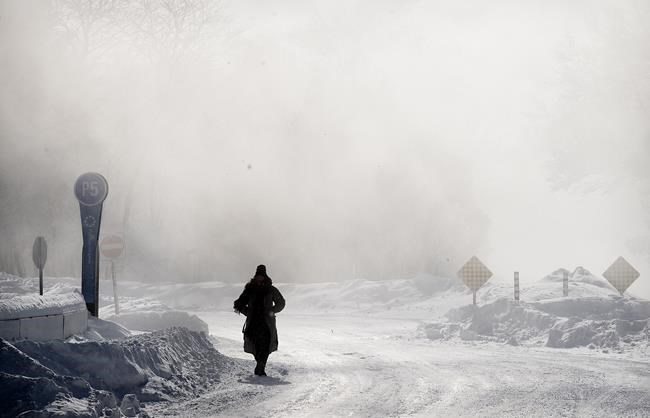HALIFAX — A cold snap that triggered Environment Canada alerts involving eight provinces and territories extended into a second day on Saturday, shattering several past temperature records and leaving thousands of customers in Atlantic Canada without power.
A massive arctic air system that blanketed much of the country on Friday previously prompted the weather agency to issued extreme cold alerts for six provinces spanning Ontario to Newfoundland and Labrador, as well as some communities in Nunavut and the Northwest Territories. The bulk of those alerts remained in place on Saturday, though they had been lifted for southern regions of Quebec and Ontario as temperatures were forecast to rise in those areas.
Environment Canada meteorologist Darin Borgel said the persistent, frigid temperatures and wind chill values are “unprecedented” for the region.
“This has been an absolutely record-breaking cold snap for all of Eastern Canada,” Borgel said in an interview, noting temperatures feel like -40 C to -50 C in some areas
Borgel said the cold snap was brought on by an immense Arctic air mass that he expects will pass by Sunday afternoon.
The freezing temperatures and accompanying winds also prompted widespread power outages in Nova Scotia, New Brunswick and Prince Edward Island. Nova Scotia Power at one point had upwards of 25,000 customers in the dark, though that number had fallen below 13,000 as of early Saturday afternoon.
Matt Drover, a senior director with the utility, said in an email that frigid temperatures can damage equipment and “trip protective devices” which can cause power outages.Â
He said power restoration work began early Saturday morning and it’s expected residents will have electricity restored by the end of the day.Â
More than 6,000 people were without power in New Brunswick Saturday afternoon. In P.E.I., service was restored for all but 350 of the roughly 2,300 customers who were without power at the peak of the outages.
Borgel said while arctic air masses trigger cold snaps throughout the Canadian winter, this one stands out due to its brevity and severity.Â
“This is one of the coldest (cold snaps) we have seen in a long time," Borgel said.
Fortunately, he said, it's also expected to be short-lived. While some cold snaps can extend for days, Borgel forecast temperatures would start to rise in most areas by Sunday.Â
Friday saw five New Brunswick communities break records for coldest temperatures ever tracked on Feb. 3, according to an Environment Canada statement released Saturday.
In Moncton, for instance, temperatures dropped to -28.1 C, which broke a 1917 cold weather record of -27.8 C for that date. The communities of Grand Manan, Miscou Island, Saint John and St. Stephen also saw records fall.
When factoring in the wind chill, Borgel said conditions in some parts of New Brunswick felt like -40 C, while areas in the northern part of the province experienced winds that made it feel like -50 C.
“This is quite unprecedented, we’ve never seen anything that cold there for quite some time,” Borgel said.
Five Nova Scotia communities also broke records for the coldest temperatures tracked on that particular day.Â
The Halifax area experienced -25.6 C Friday without the wind chill, well below the Feb. 3, 1971 record of -24.4 C.Â
A record from 1885 was broken in Yarmouth, where Friday's temperatures dropped to -21.8 C before the wind chill. The previous cold weather record for Feb. 3 was -18.9 C. Brier Island, Kentville and Port Hawkesbury also set new local cold-weather records.
The onset of the freezing conditions on Friday sent cities, towns, governments and private agencies scrambling to provide shelter for vulnerable people. In such conditions, frostbite can develop in minutes on exposed skin.
This report by The Canadian Press was first published Feb. 4, 2023.
---
This story was produced with the financial assistance of the Meta and Canadian Press News Fellowship.
Lyndsay Armstrong, The Canadian Press


